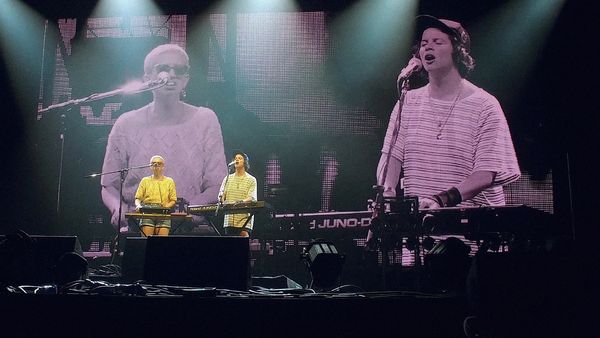Eye For Film >> Movies >> A Girl's Band (2018) Film Review
A Girl's Band
Reviewed by: Jane Fae

It lies, it does. But maybe not in a bad way. The title - Una Banda De Chicas – tells you this is a film about A Girl Band. Or maybe a band of girls which, in the widest sense is closer to the truth. For this is not a film about a band but, as we gradually discover, a film about bands, plural. Girl bands, in Argentina and abroad, in all their wonderful, challenging, provocative, musical glory.
Watching the film I fell in love with at least half a dozen great bands and female performers. To name but a few: Las Taradas, Las Kellies, Kumbia Queers, Ibiza Pareo, Liers, Miss Bolivia. And Yilet, whose one-time bass player, Marilina Giménez, is behind the lens for this documentary. As she puts it: "I changed the bass for the camera”. Her way of staying part of a scene and an experience that has enriched her life.

And let us not forget Chocolate Remix. Yes, yes, yes! When are they coming to Europe? Described as an Argentine lesbian/feminist group, they are busy reclaiming reggaeton, a style of music closely linked to hip hop, originating in Puerto Rico, and frequently criticised for its use of violent and sexual themes. Yet, led by charismatic vocalist Romina Bernardo, Chocolate Remix have taken the genre off in an entirely other direction.
For a key theme to which Banda De Chicas returns time and again is how women, by inserting themselves in the music scene, are not just building on forms and tropes already there but taking them off in altogether different directions: making them their own.
Marlina frames the film as autobiographical and it includes a good few elements of self-examination: a questioning of how she got into playing for a band, what it meant to her. But this film is far more than that.
Yes, it showcases a host of girl bands playing in and around Argentina today. Not just the ones whose performance forms the soundtrack to this film: but also the long, long list of bands cut and pasted on screen just before the end credits. If you have a spare hour or so to pass, you could do worse than sit back and put this film on as soundtrack to your afternoon.
But that list in and of itself makes a strong point. For in between the music are conversations with the women making the music. Obvious points surface. How an empowered woman is not respected: how the highest compliment paid by a male-dominated music industry to a woman drummer is that she “plays like a guy”. The put-downs. The harassment.
The ways in which men in the music industry don't like it when a woman tells them what to do: especially when it comes to setting up on stage. Because engineers – mostly guys! - know best, don't they, when it comes to sound levels and the like?
So much so predictable: this is the small change of liberation, and no matter what the field, what the industry, you will hear the same conversation over and over, as women press against the glass ceiling. Here, there, scoring an occasional success.
Still, there are bigger questions. The breakthrough at one level is about women taking up and creating their own styles in genres previously associated with male players: hard rock, punk, reggaeton. Yet this generates a new dynamic and new questions. One twist, that emerges in more than a few lyrics, is that women are not afraid to take the lead sexually: to be more assertive, physical. To demand that their partners – of whatever gender – have thought for their satisfaction and, if they do not, expect to be out on their ear.
Little surprise, then, that the film, towards the end, looks at the overlap between this wave of girl bands and campaigns for abortion rights.
Still, it leaves behind some interesting, subtle, questions. On the one hand, the film highlights the absence of girl bands from commercial spaces. As one observes: “there are still almost no female bands on the line-up of big festivals and that shocks me.”
Yet, as the listing of woman bands out there makes clear, “we are the tip of the iceberg.” This music, this scene, is valid, engaging and yet for now mostly ignored by a male-dominated music industry.
So just take what is here, and sign them up to the mainstream? No. Because events organised by men, organised to a commercial agenda, are not the same.
Perhaps this is the same dilemma that has faced artists down the ages. The performers embody a new sense of the sensual, of (sexual) aggressivity. This is women doing it for themselves. But how different is it really? On the inside, when you add up the motives, the sense of liberation that inspires not just the performers, but the audience as well, this is new, different.
On the outside? The fear, as this formula proves more and more popular, is not so much pink-washing as punk-washing. That big business will move in but those who are, in the end, elevated, will mostly not be the true pioneers of this new wave of girl music, but rather those who are prepared to look like the pioneers.
Outwardly empowered: inwardly the new handmaidens of a music industry that cares little for the whys and wherefores of its product. Wants only the royalties and ticket sales it brings.
In the end, will the music revolution stay authentic? Or will it, once again, be subverted by big business.
A fascinating documentary.
Reviewed on: 05 Oct 2019














